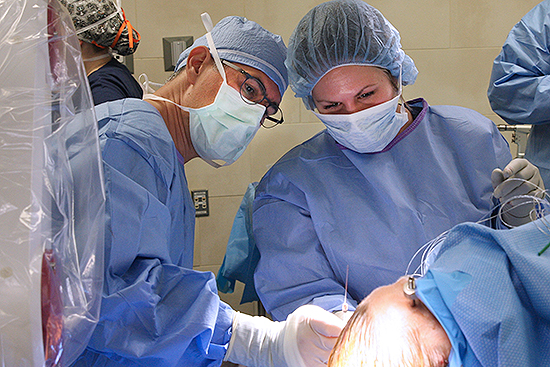The Epilepsy, Movement Disorders and Psychiatry Surgical Program, under the direction of Jorge A. González-Martínez, MD, PhD, at the University of Pittsburgh encompasses the treatment of medically intractable epilepsy, movement disorders and psychiatry disorders. These pathological neurological conditions are similar in that successful neurosurgical treatment requires an expert understanding of the involved brain networks and their potential for modulation by functional neurosurgical procedures, as well as multidisciplinary teams that deliver surgical care to these special groups of patients. Dr. González-Martínez has expertise in both adult and pediatric patients. Pediatric patients are treated at the UPMC Children’s Hospital of Pittsburgh, one of the best pediatric hospitals in the country, as noted in U.S. News and World Report.
UPMC also houses the region’s foremost centers for the comprehensive neurosurgical treatment of all types of adult and pediatric epilepsy, including epilepsy caused by lesions visible on MRI (mesial temporal sclerosis, cortical dysplasia, neurodevelopmental brain tumors, cavernous malformations, etc.) and epilepsy where the seizure onset location is not obvious and must be localized by intracranial monitoring, including stereo-electroencephalography (SEEG). Part of the University of Pittsburgh Comprehensive Epilepsy Center, the surgery program is one of the busiest—and most renowned—programs offering the latest less invasive, innovative and conventional surgical treatments, including responsive neurostimulation, laser thermal ablation, deep brain stimulation and incisionless endoscopic nasal resections in patients with temporal lobe epilepsy.
Dr. González-Martínez, co-director of the epilepsy center, has the country’s largest experience in SEEG implantations, SEEG guided resections and neuromodulation surgeries, with more than 3,000 successful surgical procedures performed. In order to promote an optimal safety profile and seizure outcome, many procedures are performed under robotic guidance. In addition of developing and implementing the SEEG method in North America, Dr. González-Martínez is also a pioneer in robotic surgery, having performed more than 1,000 procedures using this technique. The University of Pittsburgh has the largest experience in robotic neurosurgery in the country and was one of the first institutions in adopting the novel technology.
In addition to clinical activities, The Epilepsy, Movement Disorders and Psychiatry Surgical Program is considered one the premier programs in the country regarding translational and basic science research, working in collaboration with the University of Pittsburgh Department of Neuroscience, Carnegie Mellon University Department of Biomedical Engineering, John Hopkins University and Aix Marseille University in France. The program’s research activities are led by Dr. González-Martínez and his research team and conducted through the University of Pittsburgh Cortical Systems Laboratory.

